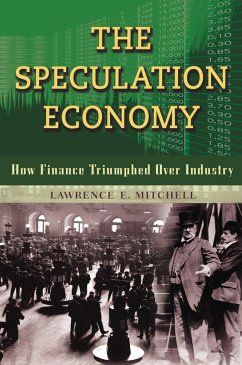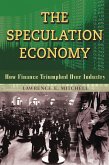A fascinating account of the early twentieth century emergence of a stock-market-oriented economy. BusinessWeek
American companies once focused exclusively on providing the best products and services. But today, most corporations are obsessed with maximizing their stock prices, resulting in short-term thinking and the kind of cook-the-books corruption seen in the Enron and WorldCom scandals of the first decade of the twenty-first century. How did this happen?
In this groundbreaking book, Lawrence E. Mitchell traces the origins of the problem back to the first decade of the preceding century, when industrialists and bankers began merging existing companies into huge combines today s giant corporations so they could profit by manufacturing and selling stock in these new entities. He describes and analyzes the legal changes that made this possible, the federal regulatory efforts that missed the significance of this transforming development, and the changes in American society and culture that led more and more Americans to enter the market, turning from relatively safe bonds to riskier common stock in the hopes of becoming rich. Financiers and the corporations they controlled encouraged this trend, but as stock ownership expanded and businesses were increasingly forced to cater to stockholders get rich quick expectations, a subtle but revolutionary shift in the nature of the American economy occurred: finance no longer served industry; instead, industry began to serve finance.
The Speculation Economy analyzes the history behind the opening of this economic Pandora s box the root cause of so many modern acts of corporate malfeasance.
American companies once focused exclusively on providing the best products and services. But today, most corporations are obsessed with maximizing their stock prices, resulting in short-term thinking and the kind of cook-the-books corruption seen in the Enron and WorldCom scandals of the first decade of the twenty-first century. How did this happen?
In this groundbreaking book, Lawrence E. Mitchell traces the origins of the problem back to the first decade of the preceding century, when industrialists and bankers began merging existing companies into huge combines today s giant corporations so they could profit by manufacturing and selling stock in these new entities. He describes and analyzes the legal changes that made this possible, the federal regulatory efforts that missed the significance of this transforming development, and the changes in American society and culture that led more and more Americans to enter the market, turning from relatively safe bonds to riskier common stock in the hopes of becoming rich. Financiers and the corporations they controlled encouraged this trend, but as stock ownership expanded and businesses were increasingly forced to cater to stockholders get rich quick expectations, a subtle but revolutionary shift in the nature of the American economy occurred: finance no longer served industry; instead, industry began to serve finance.
The Speculation Economy analyzes the history behind the opening of this economic Pandora s box the root cause of so many modern acts of corporate malfeasance.
A fascinating account of the early 20th century emergence of a stock-market-oriented economy.
BusinessWeek
The fullest and most persuasive account of the origins of the modern corporate myopic emphasis on the almighty quarterly bottom line, and of the emergence of everyman (and woman) as speculator. Equally valuable are the insights into the early efforts to address the growing power of corporations and the men who dominated them.
Maury Klein, Business History Review
Mitchell has successfully constructed a highly engaging book about a fundamental but somewhat unexplored period in U.S. financial market history. Carola Frydman, Journal of Economic History
Mitchell s writing is graceful, comprehensive, and persuasive that as significant as the story of trusts and the trustbusters has been, the rise of finance capitalism and ultimately its federal coordination through such agencies as the Federal Reserve System and the Securities and Exchange Commission may be even more important.
Joel Seligman, President, University of Rochester, and author of The Transformation of Wall Street.
Lawrence Mitchell s new work is full of fresh insight Anyone interested in the development of our modern financial markets will be richly rewarded by a careful reading.
Harvey J. Goldschmid, Dwight Professor of Law, Columbia University, former Member, United States Securities and Exchange Commission
BusinessWeek
The fullest and most persuasive account of the origins of the modern corporate myopic emphasis on the almighty quarterly bottom line, and of the emergence of everyman (and woman) as speculator. Equally valuable are the insights into the early efforts to address the growing power of corporations and the men who dominated them.
Maury Klein, Business History Review
Mitchell has successfully constructed a highly engaging book about a fundamental but somewhat unexplored period in U.S. financial market history. Carola Frydman, Journal of Economic History
Mitchell s writing is graceful, comprehensive, and persuasive that as significant as the story of trusts and the trustbusters has been, the rise of finance capitalism and ultimately its federal coordination through such agencies as the Federal Reserve System and the Securities and Exchange Commission may be even more important.
Joel Seligman, President, University of Rochester, and author of The Transformation of Wall Street.
Lawrence Mitchell s new work is full of fresh insight Anyone interested in the development of our modern financial markets will be richly rewarded by a careful reading.
Harvey J. Goldschmid, Dwight Professor of Law, Columbia University, former Member, United States Securities and Exchange Commission








